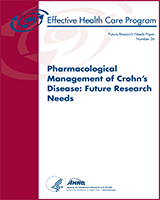NCBI Bookshelf. A service of the National Library of Medicine, National Institutes of Health.
This publication is provided for historical reference only and the information may be out of date.
Excerpt
The clinical management of Crohn's disease is complicated. Practice guidelines for Crohn's disease recommend that clinicians take into account the disease location, severity, complications, and extra-intestinal manifestations when choosing a treatment strategy. However, no universal treatment strategy exists. The lack of consensus about the best treatment strategy can result in confusion and frustration for the Crohn's disease patient as well as practitioners who treat Crohn's disease patients.
Medications are the preferred treatment for Crohn's disease with surgical interventions reserved for complications of disease or evidence of dysplasia. Medical therapy in Crohn's disease targets intestinal inflammation with the intent of altering the natural history of the disease. Corticosteroids and aminosalicylates such as sulfasalazine have been used since the 1950s. Immunomodulators (6-mercaptopurine, azathioprine, and methotrexate) have been used for the treatment of Crohn's disease since the 1970s, although use of these medications was not routine until the 1990s. The first biologic tumor necrosis factor (TNF)-alpha inhibitor, infliximab, was approved by the Food and Drug Administration (FDA) for the treatment of Crohn's disease in adults in 1998. The FDA-approved monoclonal antibodies against TNF-alpha inhibitor also include adalimumab and certolizumab pegol. Another biologic agents used for the treatment of Crohn's disease include natalizumab, a monoclonal antibody against cellular adhesion molecule α4-integrin that is FDA-approved for Crohn's disease in adults.
Our recent systematic review addressed several Key Questions in the management of Crohn's disease. In that review, we identified several important gaps in the evidence. We used the population, intervention, comparison, outcome, timing, setting (PICOTS) framework to identify gaps from the evidence in relationship to the populations, interventions, comparisons, outcomes, timing, and settings relevant to treatments for Crohn's disease. Several gaps related to the target population (children, non-white, and risk stratification based on patient characteristics). Other gaps related to interventions and comparisons of interest (step up versus top down treatment and head to head comparisons within and between treatment classes), outcomes of interest (mucosal healing, and patient-reported symptoms), or a timing issue (remission beyond 2 years). The objective of this report is to identify and prioritize existing gaps in the synthesized literature pertaining to pharmacological induction and maintenance of remission for patients with Crohn's disease by engaging stakeholders using a modified Delphi method.
Contents
Prepared for: Agency for Healthcare Research and Quality, U.S. Department of Health and Human Services1, Contract No. 290-2007-10061-I. Prepared by: Johns Hopkins University Evidence-based Practice Center, Baltimore, MD
Suggested citation:
Hutfless S, Lau BD, Wilson LM, Lazarev M, Bass EB. Pharmacological Management of Crohn's Disease: Future Research Needs. Future Research Needs Paper No. 26. (Prepared by the Johns Hopkins University Evidence-based Practice Center under Contract No. 290-2007-10061-I.) AHRQ Publication No. 13(14)-EHC017-EF. Rockville, MD: Agency for Healthcare Research and Quality. February 2014. www.effectivehealthcare.ahrq.gov/reports/final.cfm.
This report is based on research conducted by the Johns Hopkins University Evidence-based Practice Center (EPC) under contract to the Agency for Healthcare Research and Quality (AHRQ), Rockville, MD (Contract No. 290-2007-10061-I). The findings and conclusions in this document are those of the author(s), who are responsible for its contents; the findings and conclusions do not necessarily represent the views of AHRQ. Therefore, no statement in this report should be construed as an official position of AHRQ or of the U.S. Department of Health and Human Services.
The information in this report is intended to help health care researchers and funders of research make well-informed decisions in designing and funding research and thereby improve the quality of health care services. This report is not intended to be a substitute for the application of scientific judgment. Anyone who makes decisions concerning the provision of clinical care should consider this report in the same way as any medical research and in conjunction with all other pertinent information, i.e., in the context of available resources and circumstances.
None of the investigators have any affiliation or financial involvement that conflicts with the material presented in this report.
- 1
540 Gaither Road, Rockville, MD 20850; www
.ahrq.gov
- Review Management of inflammatory bowel disease with infliximab and other anti-tumor necrosis factor alpha therapies.[BioDrugs. 2010]Review Management of inflammatory bowel disease with infliximab and other anti-tumor necrosis factor alpha therapies.Magro F, Portela F. BioDrugs. 2010 Dec 14; 24 Suppl 1:3-14.
- Review Certolizumab pegol for the management of Crohn's disease in adults.[Clin Ther. 2009]Review Certolizumab pegol for the management of Crohn's disease in adults.Rivkin A. Clin Ther. 2009 Jun; 31(6):1158-76.
- Review Pharmacologic Therapies for the Management of Crohn's Disease: Comparative Effectiveness[ 2014]Review Pharmacologic Therapies for the Management of Crohn's Disease: Comparative EffectivenessHutfless S, Almashat S, Berger Z, Wilson LM, Bonson E, Chen Q, Donath E, Herlong F, Puhan MA, Selvaraj S, et al. 2014 Feb
- Comparative effectiveness of immunosuppressants and biologics for inducing and maintaining remission in Crohn's disease: a network meta-analysis.[Gastroenterology. 2015]Comparative effectiveness of immunosuppressants and biologics for inducing and maintaining remission in Crohn's disease: a network meta-analysis.Hazlewood GS, Rezaie A, Borman M, Panaccione R, Ghosh S, Seow CH, Kuenzig E, Tomlinson G, Siegel CA, Melmed GY, et al. Gastroenterology. 2015 Feb; 148(2):344-54.e5; quiz e14-5. Epub 2014 Oct 16.
- Certolizumab pegol: new drug. As a last resort in Crohn's disease: continue to use other TNF alpha inhibitors.[Prescrire Int. 2009]Certolizumab pegol: new drug. As a last resort in Crohn's disease: continue to use other TNF alpha inhibitors.. Prescrire Int. 2009 Jun; 18(101):108-10.
- Pharmacological Management of Crohn's Disease: Future Research NeedsPharmacological Management of Crohn's Disease: Future Research Needs
- Wireless Motility Capsule Versus Other Diagnostic Technologies for Evaluating Ga...Wireless Motility Capsule Versus Other Diagnostic Technologies for Evaluating Gastroparesis and Constipation: Future Research Needs
Your browsing activity is empty.
Activity recording is turned off.
See more...
